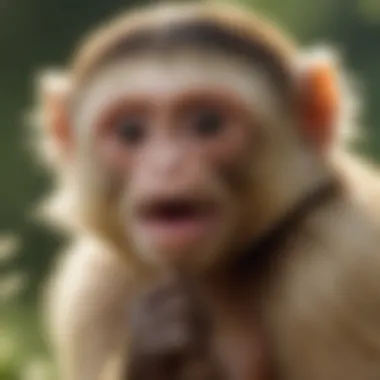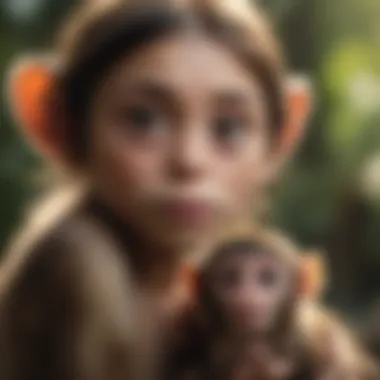Cost Analysis of Little Monkeys: Ownership Considerations


Intro
Owning a little monkey can spark interest, but the complexities of their costs often escape prospective pet owners. With factors ranging from initial purchase price to long-term care expenses, understanding these intricacies is crucial. This article will delve into the various cost elements associated with little monkeys, emphasizing not only the financial implications but also the ethical responsibilities tied to their ownership.
Fascinating Facts About the Animal
Unique Characteristics
Little monkeys, often species such as marmosets or capuchins, capture attention with their striking features. Each species has distinct physical traits, from the marmoset’s fluffy tufted ears to the capuchin's expressive face. These traits contribute not only to their charm but also influence their cost. The rarity and popularity of specific species directly affect their market price.
Extraordinary Abilities
These animals are not just cute; they demonstrate impressive cognitive skills. Studies show they can solve simple puzzles and even use tools. Such abilities make them intriguing companions but also underline the necessity for proper stimulation and enrichment in their care. This requirement translates into additional costs for owners in terms of toys, space, and time.
Behavior and Habitat
Natural Habitats
Little monkeys are typically found in tropical rainforests, naturally adapted to solid canopy living. Their environmental needs should be respected, suggesting that safe, spacious enclosures are essential for pet ownership. Such considerations impact the overall financial commitment a pet owner must undertake.
Social Structures
Social beings by nature, little monkeys thrive in groups. This has implications for potential owners. Isolating a single monkey can lead to behavioral problems, leading owners to consider obtaining multiple monkeys, consequently increasing their costs. Owners must recognize that these animals require social interaction, either from their kind or from humans.
Recent Scientific Discoveries
Latest Research Findings
Research on primates frequently uncovers insights about their behavior, health, and welfare needs. Discoveries regarding their social interactions and stress levels are particularly relevant for potential owners. New findings can shape how owners understand their pet's needs and how to provide appropriate care for them.
Breakthroughs in Animal Biology
Advancements in veterinary medicine and animal biology have made it easier to treat common health issues in monkeys. However, these modern treatments can also lead to increased long-term costs for owners. Being informed on these medical developments is vital when considering the overall financial implications of owning a little monkey.
Cultural Significance
Animals in Folklore
Monkeys often appear in various cultural tales, symbolizing mischief or wisdom. Understanding their cultural significance can enrich the human-animal bond, but it may also falsely elevate expectations around ownership. People might think owning one will result in an exotic experience reflecting these traits, forgetting the responsibilities attached to caring for such a unique creature.
Influence on Art and Literature
Throughout history, monkeys have influenced the arts. Their depictions range from humorous to symbolic, serving as reminders of our connection with nature. This cultural aspect can shape perspectives on pet ownership, making it essential for owners to educate themselves beyond aesthetic appreciation.
Owning a little monkey requires more than just financial investment; it demands a commitment to lifelong care and understanding of their needs.
As we continue to explore the costs associated with these fascinating creatures, it is important to keep in mind the responsibilities that go hand in hand with the joy of ownership.
Intro to the Market for Little Monkeys
The market for little monkeys, which has seen a noticeable increase in interest over the years, brings unique dynamics that potential owners must navigate. Understanding this market is crucial for anyone considering adding a monkey to their family. First and foremost, it is important to recognize that little monkeys are not typical pets. They come with extensive responsibilities as well as emotional and financial commitments.
Current trends show that species such as capuchins and tamarins are gaining popularity. Their appeal lies not only in their playful behavior but also in their companionship. However, this increasing demand brings ethical concerns regarding breeding and ownership practices. Potential owners must consider if they are capable of providing a suitable environment and care, which includes a specialized diet and social needs.
Evaluating current prices in the market reveals that costs can significantly vary based on factors like species, age, and breeding sources. Additionally, fluctuations in prices occur due to regional demand, regulatory constraints, and the presence of exotic animal markets. All these elements influence both the initial purchase price and the ongoing costs associated with ownership.
Moreover, this market is intertwined with legal considerations that potential owners cannot overlook. Understanding the nuances of local and federal regulations regarding pet ownership is essential to ensure compliance and avoid legal repercussions.
Finally, being informed about the market allows prospective owners to gauge their own capabilities effectively. Can they afford the initial costs? Are they ready for the long-term commitment? These questions outline the basic framework for karar-making in the journey of little monkey ownership. Consequently, this market overview sets the stage for a deeper dive into the specific factors that influence the costs of little monkeys.
Factors Influencing the Cost of Little Monkeys
The cost of little monkeys is not solely based on their purchase price. Numerous factors contribute to these costs, making it essential for potential owners to understand them fully. The interplay of species, age, breeder reputation, and geographic location significantly influences pricing. This knowledge aids individuals in making informed decisions, ensuring not just a financial commitment but also a moral obligation toward responsible ownership.


Species Variability
Popular Species Overview
Various species of little monkeys are available for ownership, each with its specific traits and care requirements. Popular species, such as the Capuchin or Marmoset, tend to be more accessible and thus, their pricing reflects their widespread availability. These species are also known for their inquisitive and playful nature, making them appealing choices for families.
One key characteristic of popular species is their adaptability to captivity. Many of these monkeys thrive in a home environment, which is advantageous for new pet owners. However, the ease of care may create a false sense of simplicity. Each species still requires significant time and dedication.
Rare Species and Their Values
Rare species, such as the Tamarins or Aye-ayes, can carry high price tags due to their limited availability and unique needs. The appeal of owning a rare species often leads to inflated prices. These species can become conversation starters or exotic additions to a home, although they may require highly specific care demands not found with more common species.
Their unique features can create a challenge in terms of care. Owners must familiarize themselves with proper habitats, diets, and social interactions, which may lead to increased ongoing costs.
Age and Development Stage
Pricing for Infants vs.
Adults
The age of a little monkey at the time of acquisition plays a significant role in cost analysis. Infants are generally more expensive than adults. This is largely due to their development stage; a young monkey typically requires specialized care that tends to demand a higher financial investment.
Purchasing a juvenile monkey can be beneficial as they are often easier to socialize and train. However, this comes with a lifetime commitment, as these young creatures grow into adults with specific behavioral needs.
Health Considerations and Costs
Health considerations add another layer to cost analysis. Young monkeys might seem less expensive in initial purchase but could require more veterinary attention as they grow. Adult monkeys, while often cheaper to obtain, may come with existing health issues necessitating ongoing medical care. Potential owners should prioritize health screenings before making a purchase, as these costs can add up quickly.
Breeder Reputation
Ethical Breeding Practices
Choosing a reputable breeder is crucial. Ethical breeding practices prioritize the health and well-being of little monkeys. A breeder who raises monkeys responsibly will charge more upfront, ensuring the animals are well-cared for and properly socialized before being sold.
The importance of ethical breeding cannot be understated; it affects the monkey’s temperament and overall health. Responsible breeders aim to eliminate genetic issues often seen in poorly bred monkeys. Therefore, investing in a reputable source is, in the long run, a more prudent choice.
Costs Associated with Reputable Sources
Buyers may find that reputable breeders often have higher price tags. This is due to their commitment to ethical practices, ensuring animals are free from inherited health issues and other problems common in less reputable sources. Ultimately, spending more initially can lead to fewer unexpected costs related to health problems down the road.
Geographic Location
Regional Price Variations
The geographical location of the buyer can heavily influence the cost. Prices for little monkeys can vary significantly from one region to another. Urban areas may show inflated prices due to high demand, while rural areas may offer lower costs due to fewer buyers.
Understanding regional price variations is essential for budgeting effectively. This consideration serves as a way to evaluate the true cost and market value of the chosen species.
Import Costs and Regulations
Importing monkeys from other regions or countries adds another financial layer. Regulations vary based on local, state, and federal guidelines, potentially leading to hidden costs such as permits or import fees. Understanding these regulatory practices is vital before pursuing ownership, as they can significantly affect total ownership costs.
Initial Costs of Obtaining a Little Monkey
The initial costs associated with acquiring a little monkey are critical to understand for anyone considering this type of pet ownership. These costs not only include the purchase price but also various setup expenses. Assessing these costs helps potential owners gauge the financial commitment required for responsible ownership. It is essential to recognize that the initial investment could set the tone for the long-term relationship with the animal.
Purchase Price Breakdown
Typical Price Ranges for Different Species
The purchase prices of little monkeys vary widely based on species. Common species such as the capuchin or squirrel monkeys might range from $5,000 to $10,000. In contrast, rarer species can command much higher prices, sometimes exceeding $20,000.
This variability stems from popularity, availability, and the specific requirements that come with different types of monkeys. For someone looking to own a monkey, understanding these price ranges is vital. Choosing a species with a moderate price can be a more sustainable option for many families, as it allows for a better balance between initial costs and ongoing care.


The unique aspect of these price ranges is their influence on the owner's decision-making. Higher costs might discourage impulsive purchases, while lower-cost species could lead to underestimating the expenses required in the long run.
Hidden Fees in Purchases
Beyond the initial purchase price, prospective owners must consider hidden fees. Such fees can include shipping charges, health checks, and initial vaccinations, which may add several hundred dollars to the total cost. The existence of these hidden costs often surprises new owners, underscoring the need for thorough financial planning.
These hidden fees can pose significant challenges for families who may have initially budgeted for the purchase price alone. Recognizing the full picture of these expenditures is imperative for preparing for ownership. An advantage of awareness is that it can help individuals select breeders who are transparent about costs, fostering informed decisions.
Setup Costs for a Suitable Environment
Housing Requirements
Creating an appropriate living environment is another cornerstone of owning a little monkey. Housing requirements are not just about comfort but also about ensuring the safety and health of the animal. A suitable enclosure can range from $1,000 to $3,000, depending on the size and complexity needed.
A well-constructed habitat is vital. It ensures that the little monkey has enough space to move and explore safely. It also protects the animal from exposure to hazards inherent in the domestic setting. Overall, the housing setup is essential for any potential owner to prioritize, as it directly relates to the monkey's well-being and long-term happiness.
Feeding and Enrichment Needs
Feeding and enrichment needs are critical components of a monkey's life. Diet varies by species but can average $20 to $50 per week, depending on dietary preferences and nutritional needs. In addition to food, enrichment items—such as toys and climbing structures—are necessary to promote mental and physical health.
Provisioning for these needs can become an ongoing expense, significantly influencing the overall costs of ownership. Understanding the daily and weekly feeding plans can help prospective owners assess whether they can afford to maintain a happy and healthy environment for their little monkey. Ultimately, these needs must be factored into any cost analysis before making a commitment to ownership.
Owning a little monkey requires careful evaluation of both initial and ongoing costs, ensuring that the financial commitment supports responsible and ethical ownership.
Ongoing Costs of Monkey Ownership
Ongoing costs of monkey ownership are crucial to understand before committing to this responsibility. These expenses include daily care, maintenance, veterinary care, and insurance. Owners need to consider these aspects carefully to ensure they can meet the needs of the animal throughout its life. Poor financial planning can lead to neglect or abandonment, which is not acceptable.
Daily Care and Maintenance Expenses
Daily care for monkeys involves both food and health aspects. Understanding these needs ensures the wellbeing of these intelligent creatures.
Food and Nutrition
Food and nutrition for little monkeys play a significant role in their overall health. Proper diets can significantly impact their longevity and behavior. Monkeys require a mix of fruits, vegetables, and specially formulated pellets. This unique feature of their diet fosters not only health but also satisfies their instincts to explore and forage.
Key Benefits:
- A balanced diet promotes better health and lowers future veterinary costs.
- Encourages natural behaviors, reducing stress and behavioral issues.
However, the costs can vary. While fruits and veggies can be sourced locally, specialized pellets might add expenses. Budgeting for these food costs is necessary to maintain a healthy diet for your monkey.
Health Care Needs
Health care needs are another essential aspect of ongoing costs. Regular veterinary visits are crucial for monitoring health and addressing issues early on. Monkeys may require vaccinations, flea treatments, and regular health check-ups. This regular interaction also helps in building a trusting relationship between the owner and the pet.
Key Characteristics:
- Early diagnosis of health issues can save owners from high emergency costs later.
- Development of a relationship with a vet who understands the specific needs of monkeys.
However, veterinary care can be expensive, and some owners might underestimate these costs. Therefore, planning for regular health care expenses is essential for responsible ownership.
Insurance and Veterinary Costs
Insurance and veterinary costs represent another burden on the wallet. These are often unavoidable, but they are crucial for the health of the monkey and the peace of mind for the owner.
Emergency Care
Emergency care for little monkeys requires immediate attention and can be costly. Conditions such as injuries or unexpected illnesses demand prompt care to ensure recovery. Having insurance can alleviate some financial pressure in such situations.
Key Features:
- Ensures access to high-quality veterinary services without the immediate financial burden.
- Can include various types of services, from emergency surgeries to hospitalization.


The unique feature of emergency care is its unpredictability; one can't always foresee when a monkey might need urgent help. Insuring against these emergencies can be a wise investment.
Routine Check-Ups
Routine check-ups are necessary for preventing health issues and maintaining a monkey's well-being. Regular examinations help catch potential problems and allow for vaccinations and treatments as needed. This ongoing cost is an investment in the long-term health of the animal.
Key Characteristics:
- Regular checks help to monitor changes in behavior or condition that could indicate health problems.
- Builds a history of the monkey’s health, aiding the veterinarian in providing better care.
On the downside, the frequency of these visits can accumulate in costs over time. Understanding and planning for these routine expenses is imperative for all prospective monkey owners.
In essence, ongoing costs can significantly impact the well-being of little monkeys. They require careful budgeting and attention to various needs to ensure a healthy and happy life. This commitment is about more than financial readiness; it is about a long-term dedication to animal welfare.
Legal Considerations in Monkey Ownership
Understanding the legal landscape surrounding monkey ownership is crucial for potential owners. Laws may vary significantly between regions, affecting not just the feasibility of owning a little monkey but also the ethical implications involved. Recognizing these regulations ensures that potential owners can make informed decisions that respect both the law and the well-being of the animal. This section will explore key regulatory aspects and ethical considerations that influence the overall landscape of monkey ownership.
Local and Federal Regulations
Understanding Ownership Laws
Understanding ownership laws is essential for anyone considering a little monkey as a pet. Each state or country may have specific laws governing the ownership of exotic animals. These laws often dictate what species can be owned, the licensing requirements, and even the conditions under which these animals can be kept.
The key characteristic of ownership laws is their emphasis on public safety and animal welfare. These regulations help to prevent illegal trade and ensure that animals are kept in environments that meet their needs. Ignoring these laws can lead to serious legal repercussions, not to mention potential harm to the animals themselves. Ultimately, adhering to ownership laws is beneficial in establishing a foundation of responsible pet ownership.
A unique feature of understanding ownership laws is the variability between regions. For instance, some areas have more stringent rules compared to others. This disparity may lead to confusion among prospective owners, making it difficult for them to know what is legally required. Owners should thoroughly investigate their local laws to avoid unintentional violations that could affect their ability to keep the animal.
Permits Required for Ownership
Permits required for ownership often go hand-in-hand with local regulations. In many areas, owning a little monkey necessitates obtaining a permit, which can be indicative of a responsible ownership path. This process generally involves submitting an application, paying a fee, and possibly undergoing inspections to ensure proper housing and care for the animal.
The key characteristic of permits is that they provide a legal framework ensuring that only those capable of meeting certain conditions are allowed to own exotic pets. This serves as a barrier to entry, ensuring that prospective owners are informed about the commitments involved.
A unique aspect of these permits is that they may require proof of prior knowledge or experience with primates or similar animals. This can be advantageous as it promotes responsible ownership and helps to protect animal welfare. However, the requirements can also disadvantage willing owners who may not have prior experience but are prepared to learn and provide a loving home.
Ethical Considerations and Animal Welfare
Impact of Captivity on Primate Welfare
The impact of captivity on primate welfare is a pressing concern in discussions surrounding ownership. Captivity can significantly affect a monkey's physical and mental health. Many species have complex social and environmental needs that are difficult to fulfill in a home setting. Understanding these limitations is critical for any prospective owner.
One key characteristic of captivity is the potential for behavioral issues to arise. Monkeys are social creatures and thrive in groups. When isolated, they can experience stress and develop detrimental behaviors, which can hinder their welfare. Thus, the emphasis on understanding the impact of captivity on primate welfare aligns closely with the goals of responsible ownership.
A significant feature of this impact is the burden of social responsibilities. Owners must not only meet the basic needs of the animal but also consider its social interactions and emotional well-being. This presents advantages and disadvantages, as fulfilling these needs requires commitment, time, and often financial resources.
Conservation Perspectives
Conservation perspectives shed light on the broader implications of owning little monkeys. The impact of pet ownership on wild populations is significant. Ethical ownership must consider the consequences of removing animals from their natural habitats. Some species may suffer due to overpopulation in captivity, leading to negative effects on conservation efforts.
The key characteristic of conservation perspectives is their focus on maintaining biodiversity. Supporting legal and ethical ownership practices can help protect wild populations and contribute to sustainable conservation measures. This is a beneficial outlook for the overall discourse surrounding monkey ownership and encourages responsible practices among potential owners.
A unique feature of this perspective is that it fosters a sense of community among owners who are aware of their responsibilities to both their pets and the species as a whole. However, understanding conservation also prompts potential owners to weigh their desires against the welfare of wild populations, which may lead to difficult choices.
Responsible monkey ownership goes beyond personal desire; it necessitates a conscientious approach that respects both the law and individual animal welfare.
Culmination: Weighing the Costs and Responsibilities
The costs associated with owning little monkeys extend beyond mere financial outlays. This concluding section emphasizes the multifaceted nature of ownership, merging fiscal responsibilities with ethical considerations. Each element connected to little monkeys demands thoughtful evaluation. It is crucial for prospective owners to grasp not only the initial and ongoing costs but also the implications for animal welfare and personal lifestyle changes.
Long-term Commitment versus Short-term Enjoyment
Reassessing Financial Viability
Reassessing financial viability is fundamental when considering the purchase and upkeep of little monkeys. This aspect urges potential owners to evaluate their budget over the long haul. Many fail to account for unexpected expenses that arise in handling exotic pets. Financial stability becomes a cornerstone of responsible ownership. Difficulties may emerge if the initial enthusiasm fades, revealing an inability to sustain care. Thus, understanding the full spectrum of financial commitments remains vital for anyone contemplating this responsibility.
Impact on Lifestyle and Family Dynamics
The impact on lifestyle and family dynamics is another key consideration for little monkey ownership. These animals require consistent attention, altering daily routines and family interactions. As they often form strong bonds with their caregivers, it is essential to reflect on how such an addition can shift household dynamics. Time management becomes critical, as well as clear communication among family members. This shift holds both advantages and disadvantages. While these animals can enhance familial bonds, they can also introduce stress if the commitment is not acknowledged. Balancing joy with practicality becomes a fundamental part of this ownership experience.
Understanding the broader implications of owning little monkeys aids potential owners in decision-making. A thorough assessment allows for informed choices, ensuring that both the owner's life and the animal's welfare are prioritized.







